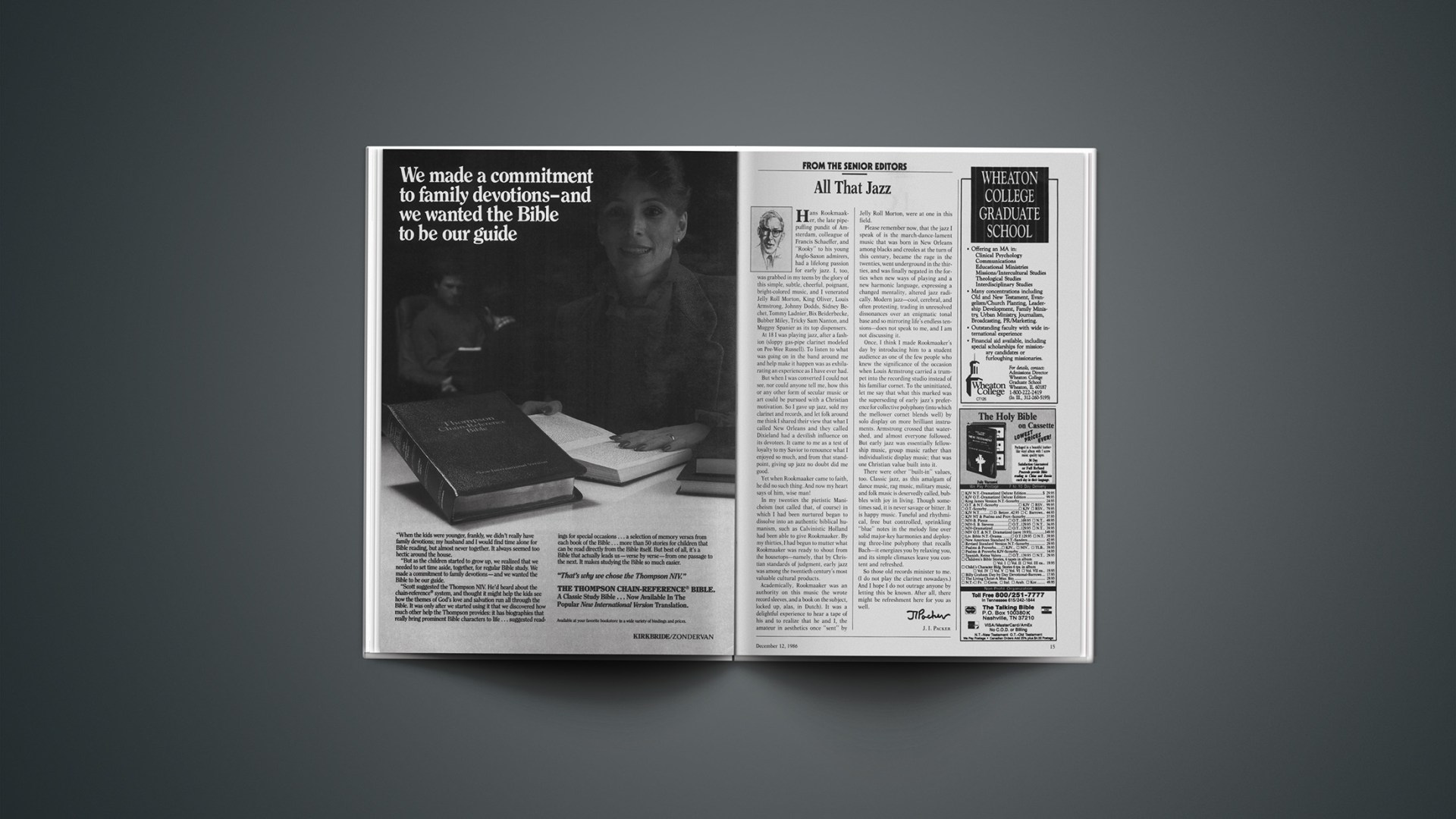Hans Rookmaaker, the late pipepuffing pundit of Amsterdam, colleague of Francis Schaeffer, and “Rooky” to his young Anglo-Saxon admirers, had a lifelong passion for early jazz. I, too, was grabbed in my teens by the glory of this simple, subtle, cheerful, poignant, bright-colored music, and I venerated Jelly Roll Morton, King Oliver, Louis Armstrong, Johnny Dodds, Sidney Bechet, Tommy Ladnier, Bix Beiderbecke, Bubber Miley, Tricky Sam Nanton, and Muggsy Spanier as its top dispensers.
At 18 I was playing jazz, after a fashion (sloppy gas-pipe clarinet modeled on Pee-Wee Russell). To listen to what was going on in the band around me and help make it happen was as exhilarating an experience as I have ever had.
But when I was converted I could not see, nor could anyone tell me, how this or any other form of secular music or art could be pursued with a Christian motivation. So I gave up jazz, sold my clarinet and records, and let folk around me think I shared their view that what I called New Orleans and they called Dixieland had a devilish influence on its devotees. It came to me as a test of loyalty to my Savior to renounce what I enjoyed so much, and from that standpoint, giving up jazz no doubt did me good.
Yet when Rookmaaker came to faith, he did no such thing. And now my heart says of him, wise man!
In my twenties the pietistic Manicheism (not called that, of course) in which I had been nurtured began to dissolve into an authentic biblical humanism, such as Calvinistic Holland had been able to give Rookmaaker. By my thirties, I had begun to mutter what Rookmaaker was ready to shout from the housetops—namely, that by Christian standards of judgment, early jazz was among the twentieth century’s most valuable cultural products.
Academically, Rookmaaker was an authority on this music (he wrote record sleeves, and a book on the subject, locked up, alas, in Dutch). It was a delightful experience to hear a tape of his and to realize that he and I, the amateur in aesthetics once “sent” by Jelly Roll Morton, were at one in this field.
Please remember now, that the jazz I speak of is the march-dance-lament music that was born in New Orleans among blacks and creoles at the turn of this century, became the rage in the twenties, went underground in the thirties, and was finally negated in the forties when new ways of playing and a new harmonic language, expressing a changed mentality, altered jazz radically. Modern jazz—cool, cerebral, and often protesting, trading in unresolved dissonances over an enigmatic tonal base and so mirroring life’s endless tensions—does not speak to me, and I am not discussing it.
Once, I think I made Rookmaaker’s day by introducing him to a student audience as one of the few people who knew the significance of the occasion when Louis Armstrong carried a trumpet into the recording studio instead of his familiar cornet. To the uninitiated, let me say that what this marked was the superseding of early jazz’s preference for collective polyphony (into which the mellower cornet blends well) by solo display on more brilliant instruments. Armstrong crossed that watershed, and almost everyone followed. But early jazz was essentially fellowship music, group music rather than individualistic display music; that was one Christian value built into it.
There were other “built-in” values, too. Classic jazz, as this amalgam of dance music, rag music, military music, and folk music is deservedly called, bubbles with joy in living. Though sometimes sad, it is never savage or bitter. It is happy music. Tuneful and rhythmical, free but controlled, sprinkling “blue” notes in the melody line over solid major-key harmonies and deploying three-line polyphony that recalls Bach—it energizes you by relaxing you, and its simple climaxes leave you content and refreshed.
So those old records minister to me. (I do not play the clarinet nowadays.) And I hope I do not outrage anyone by letting this be known. After all, there might be refreshment here for you as well.
J. I. PACKER










